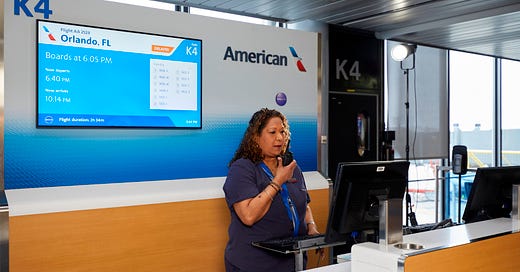Boarding Reinvented: American Airlines’ Fight Against "Gate Lice"
Innovative Approaches to Create a Smoother, More Organized Boarding Experience

For seasoned travelers, the term “gate lice” is all too familiar. It refers to the clusters of passengers who gather around the boarding gate long before their group is called, creating unnecessary congestion and frustration for everyone involved. This behavior, often driven by anxiety over securing overhead bin space, disrupts the boarding process and adds stress to an already tense part of air travel. In response, American Airlines has introduced a suite of tools and strategies aimed at minimizing this issue and making the boarding experience smoother for all passengers.
A key component of American Airlines’ solution is improving communication with passengers. Through their mobile app, the airline now provides real-time notifications when specific boarding groups are called. This feature allows passengers to remain seated and comfortable until it is their turn to board, reducing the instinct to hover near the gate. Additionally, digital displays at the gate provide clear updates on boarding progress, giving travelers a visual cue to better gauge when to prepare. A popular and interesting new concept allows gate agents to see the boarding group of the customer attempting to board, produce an audible alarm, and will ask the customer to go to the end of the line.
To further alleviate crowding, American Airlines has begun testing zoned boarding areas in select airports. These designated spaces near the gate correspond to specific boarding groups, with digital signage clearly indicating when each group should approach. This system not only streamlines the process but also eliminates confusion, discouraging passengers from prematurely lining up.
For frequent flyers and travelers with priority boarding privileges, American Airlines has introduced dedicated lanes and boarding gates. This ensures an efficient process for those passengers while reducing the temptation for others to rush the gate. By clearly separating boarding groups, the airline can better manage traffic flow and reduce congestion.
Concerns over overhead bin space are one of the primary drivers behind the gate lice phenomenon. To address this, American Airlines has introduced bin space guarantees for certain ticket classes, such as priority boarding and Basic Economy with paid baggage. Reassuring passengers that their luggage will have a place removes much of the urgency to board early, allowing for a more orderly process.
Gate agents are also playing a critical role in this transformation. American Airlines has invested in training programs to help staff diplomatically enforce boarding order while actively directing passengers to seating areas. Equipped with these skills, agents can ensure a smoother process without alienating travelers.
The airline is also seeking input from passengers to refine its boarding process. Through surveys and interviews conducted at major hubs, American Airlines collects valuable feedback to improve its tools and strategies. This data-driven approach allows the airline to continuously adapt and better meet the needs of its customers.
Early results from these initiatives have been encouraging. At Dallas/Fort Worth International Airport (DFW), for example, passengers and gate agents have reported less congestion and a more relaxed boarding atmosphere. However, some frequent travelers remain skeptical, noting that ingrained habits and the competitive nature of air travel may be difficult to overcome completely.
By addressing the gate lice problem head-on, American Airlines is setting an example for the aviation industry. Through thoughtful use of technology, clear communication, and innovative design, the airline is taking meaningful steps to reduce one of air travel’s most notorious inconveniences. While there is still work to be done, these efforts signal a brighter future for passengers seeking a more enjoyable journey from gate to sky.
Copyright © 2024 WH Intellectual Properties, LLC. All rights reserved.



